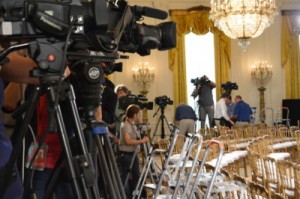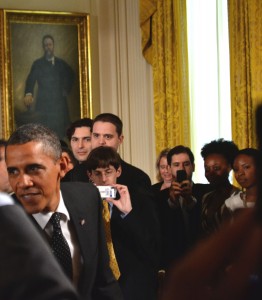WASHINGTON — There seems to be something metaphysically wrong with tweeting at a live Twitter event that’s also broadcast live online. But that’s what I did on Wednesday.
It was the first-ever Twitter Town Hall at the White House and President Barack Obama, along with host and Twitter CEO Jack Dorsey, sat in front of a high-resolution televisions, dressed in sharp suits. I sat in the back of the room crouching behind the camera stage, frantically typing away on our @medillonthehill Twitter account.
My goal during the event was to comment on the action happening in front of me – I sought to give a play-by-play, to be the Harry Carey of the White House tweet up (#WHTweetUp for the in-the-know crowd).
And tweet I did – by the end of the one-hour conference, I was quoting Obama like frat boys from my dad’s generation quoted “Animal House.”
What I find most interesting was how handling our graduate school’s Washington Twitter account forced me to concentrate fully on what the president said. It heightened and clarified my overall experience.
Perhaps, needless to say, I was a bit in awe of everything going on around me. This was the first time I had ever set foot in the White House. But, for some reason, Twitter made me less nervous. It made the event feel less surreal and more approachable. My real-time tweets at the event, meanwhile, made me feel vital, a journalist truly embedded in a moment.
Live tweeting is nothing knew. It’s arguably the most effective way for reporters to break news. NPR’s Andy Carvin (@acarvin) has told countless stories through sequential tweets that amplify action on the ground. He did this in a powerful way during the Egyptian revolution in February, for one example.
Other popular tweeters use Twitter to create fiction stories. If you’re from Chicago, you might remember the @MayorEmanuel account that made headlines for its crass use of the English vernacular in the run-up to the mayoral election. The man behind the account, a Columbia College journalism instructor, finally revealed himself to The Atlantic once Emanuel won the mayoral election. Using @MayorEmanuel, Dan Sinker pretended to be candidate Rahm Emanuel. In case you don’t know, Emanuel (he’s Chicago’s new mayor, by the way) is known for hard-hitting, not-always-family friend language. His fake Twitter persona never shied from using a certain four-letter word to convey meaning in 140 characters or less.
It seems to me that the future of journalism will require people like me to attend events and tweet live. Full-time Twitter reporters (maybe they could be called short character specialists) could be an entry-level position at established news sources, or even a desirable spot for newsroom wordsmiths. The art of crafting a good headline may have shifted to the art of creating a sharp tweet or aggregating the best news from far and wide. It’s something I’m working on and my Medill classmates are polishing as well.
And perhaps there will be more Twitter sponsored events where acclaimed guests (like presidents and leaders) will answer questions thrown at a given hash tag. Like #AskMandella or #AsktheDalaiLama. It’s essentially a way to set up a chat room in Twitter and mobilize people around a given topic or person.
Aside from the content of the event (some people will be pleased with the president’s answers, others will feel like their questions were averted or sidestepped) the structure of the event was remarkable. It was groundbreaking, at least for someone in my generation.
Perhaps it was a publicity stunt (that’s what some pundits will argue). But it did show us how far technology has taken us. It also shows our present, and future, is in large part online. The house for political debate now largely stands in short blurbs in the Twitter universe or in the social sharing space of Facebook or Google +.
As journalists, we better be ready.
———————————————
Bob Spoerl is earning his master’s in journalism from Medill. He was one of 10 students selected for a fall national security reporting scholarship. The team’s in-depth multimedia story will be published in the Washington Post this winter. That’s also when he graduates from Medill.


